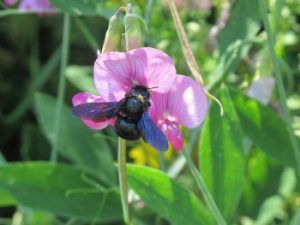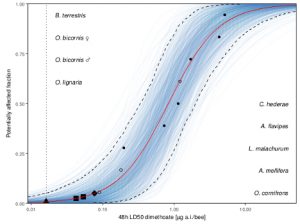In this post, the team „Community Ecology & Ecotoxicology” advertises a new Master thesis.

The violet carpenter bee Xylocopa violacea (photo by P. Uhl)
The research of the team “Community Ecology & Ecotoxicology” which is headed by Dr. Carsten Brühl is concerned with multiple stressors in landscapes and focuses also on the effects of pesticides on biodiversity and communities. Pesticides as well as biocides are considered to be drivers for changes in terrestrial and aquatic food webs. Amongst other things, we currently researching the effects of common pesticides and agricultural practice on wild bee species and insect pollinators in general.
Acute lab toxicity studies with multiple wild bee species
Start: February 2017

SSD of several bee species for dimethoate (Uhl et al. 2016)
Data on interspecific sensitivity of bees is scarce. However, to properly evaluate pesticide impact on bee communities an extensive database is needed. You will conduct acute toxicity experiments with a wide array of bee species to generate median lethal doses (LD50) using the toxic standard dimethoate and the neonicotinoid thiacloprid. Afterwards, you will derive species sensitivity distributions (SSD) for both pesticides.
The technical supervisor for all aforementioned studies will be Philipp Uhl who will also provide you background information, literature and guidance during all tasks.
If you are interested in joining the project team please contact him (uhl@uni-landau.de). Please also don’t hesitate to propose you own research ideas.
You may also have a look at:
Uhl P, Franke LA, Rehberg C, Wollmann C, Stahlschmidt P, Jeker L, Brühl CA (2016): Interspecific sensitivity of bees towards dimethoate and implications for environmental risk assessment. Scientific Reports.
